267. The stars which once
upon a time had been at the December
solstice were no longer there because the
cardinal points of the Sun had gradually
changed their positions and arrived earlier and earlier (the precession).
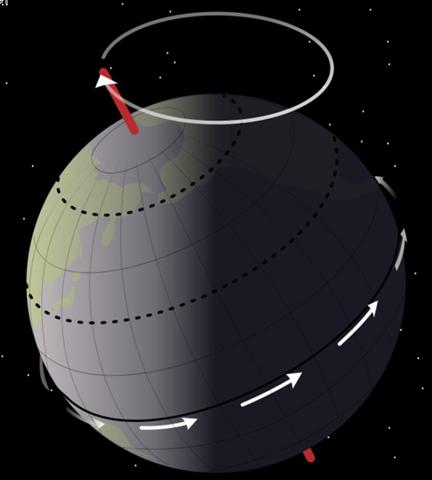
... In China, every year about the beginning
of April, certain officials called
Sz'hüen used of old to go about the
country armed with wooden clappers. Their
business was to summon the people and
command them to put out every fire. This was
the beginning of the season called
Han-shih-tsieh, or 'eating of cold
food'. For three days all household fires
remained extinct as a preparation for the
solemn renewal of the fire, which took place
on the fifth or sixth day after the winter
solstice [Sic!] ...
The ancient star points of reference had to
be adjusted in order to follow the Sun and
'the beginning of April' could therefore have been
defined from a star which once upon a time
had been at the right ascension line of
December 26 (360) or 12-27 (361 = 19 * 19),
after 3 days of 'cold food'.
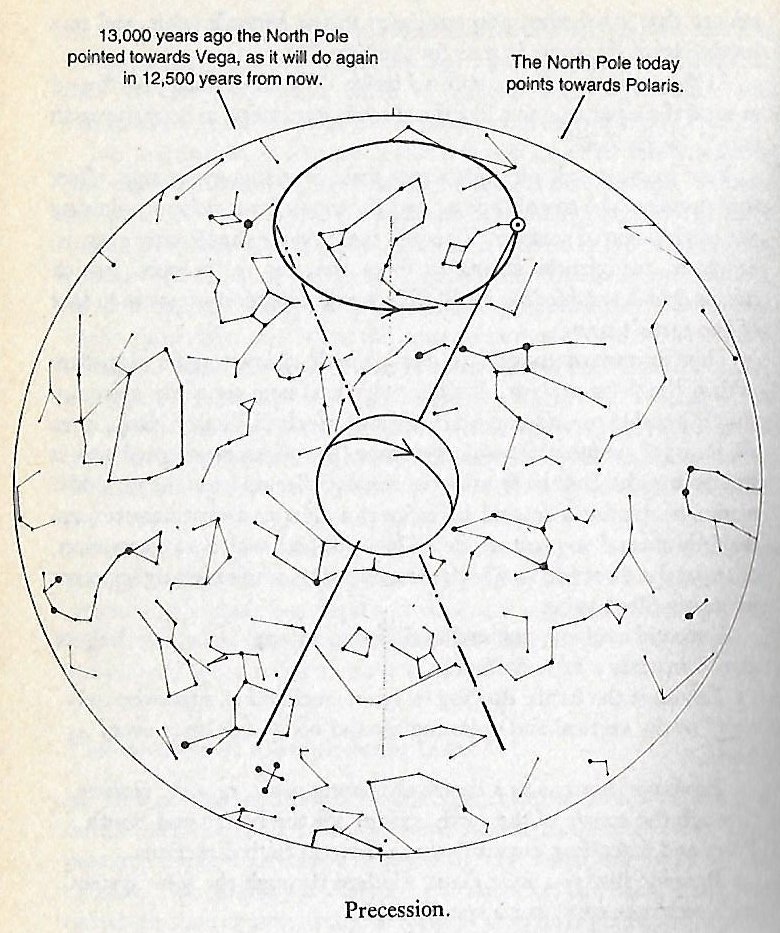
... Take the lower part of a gourd or
hula drum, rounded as a wheel (globe),
on which several lines are to be marked and
burned in, as described hereafter. These
lines are called na alanui o na hoku
hookele, the highways of the navigation
stars, which stars are also called na
hoku ai-aina, the stars which rule the
land. Stars lying outside these three lines
are called na hoku a ka lewa,
foreign, strange, or outside stars.
The first line is drawn from Hoku-paa,
the fixed or North Star, to the most
southerly star of Newe, the Southern
Cross ...
From day 19 * 19 to 'the beginning of April'
would then be a measure of how far the
precession had pushed the stars ahead in the
Sun calendar. Should we understand 'the
beginning of April' to be literally day 91
(April 1), then the measure would be 4 + 91
= 95 days before April 1 where indeed the great star Canopus (*95)
also
anciently ought to have lined up with the 8th
Babylonian ecliptic station at Tejat
Posterior - the first foot of the Gemini
twins to stand on dry (maro) Land:
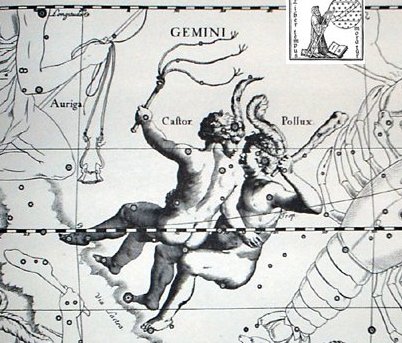
|
APRIL 17 (107) |
18 |
19 |
20 (*30) |
21 (*95 - *64) |
 |
 |
 |
 |
 |
|
Ga1-27 |
Ga1-28 |
Ga1-29 |
Ga1-30 |
Ga2-1 (31) |
|
6h (91.3)
ν Orionis (91.4), θ Columbae
(91.5), π Columbae (91.6) |
ξ Orionis (92.5) |
Al Han'ah-4 (Brand) /
Maru-sha-pu-u-mash-mashu-7
(Front of the Mouth of the
Twins)
TEJAT PRIOR = η
Gemini
(93.4), γ Monocerotis (93.5), κ
Aurigae (93.6), κ Columbae
(93.8) |
FURUD = ζ Canis Majoris
(94.9) |
Well-22 (Tapir) /
Arkū-sha-pu-u-mash-mashu-8
(Back
of the Mouth of the Twins)
δ Columbae (95.2),
TEJAT POSTERIOR = μ Gemini,
MIRZAM (The Roarer) = β Canis
Majoris
(95.4),
CANOPUS
= α Carinae
(95.6), ε Monocerotis (95.7), ψ1
Aurigae (95.9) |
|
SOLSTICE |
June 23 (174) |
ST JOHN'S DAY |
|
°June 16 |
17 (168) |
18 |
19 |
20 (*91) |
|
11 April |
12 |
13 |
4-14 (104) |
(*25 = *95 - *70) |
|
... Furud
is either from Al
Furud,
the Bright Single Ones, or,
perhaps by a transcriber's
error, from Al Kurūd,
the Apes, referring to the
surrounding small stars with
some of those of Columba; Ideler
thought the latter derivation
more probable. Al Sufi mentioned
them as Al Agribah,
the Ravens
...
...
Murzim [β
Canis Majoris], generally but
less correctly Mirzam,
and occasionally Mirza,
is from Al Murzim, the
Announcer², often combined by
the Arabs with
β
Canis Minoris in the plural Al Mirzamāni, or as
Al Mirzamā al Shi'rayain,
the two Sirian Announcers;
Ideler's idea of the
applicability of this title
being that this star announced
the immediate rising of the
still brighter Sirius. ²
Literally the Roarer, and so
another of the many words in the
Arabic tongue for the lion, of
which that people boasted of
having four hundred ... |
|
SOLSTICE |
Dec 23 (357) |
X-MAS EVE |
Day zero should then be at the
perfectly designed little Rei in
Ga1-30, in the center of the Mouth (door
opening, vaha)
of the Twins (the Gate of Cancer):
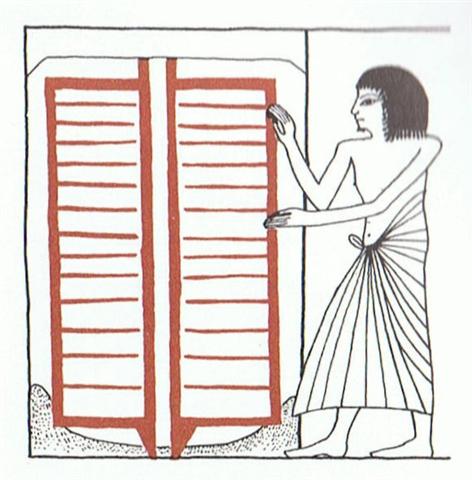
|
Vaha.
Hollow; opening; space between the
fingers (vaha rima); door
cracks (vaha papare).
Vahavaha, to fight, to wrangle,
to argue with abusive words. Vanaga.
1. Space, before T; vaha takitua,
perineum. PS Mgv.: vaha, a
space, an open place. Mq.: vaha,
separated, not joined. Ta.: vaha,
an opening. Sa.: vasa, space,
interval. To.: vaha, vahaa,
id. Fu.: vasa, vāsaà,
id. Niuē: vahā.
2. Muscle, tendon;
vahavaha,
id. Vahahora
(vaha
1 - hora
2), spring. Vahatoga
(vaha
1 - toga
1), autumn. 3. Ta.:
vahavaha,
to disdain, to dislike. Ha.:
wahawaha,
to hate, to dislike.
Churchill. |
... Men's spirits were thought to dwell in
the Milky Way between incarnations. This
conception has been handed down as an Orphic
and Pythagorean tradition fitting into the
frame of the migration of the soul.
Macrobius, who has provided the broadest
report on the matter, has it that souls
ascend by way of Capricorn, and then, in
order to be reborn, descend again through
the 'Gate of Cancer'. Macrobius talks of
signs; the constellations rising at the
solstices in his time (and still in ours)
were Gemini and Sagittarius: the 'Gate of
Cancer' means Gemini.
.jpg)
In fact, he states
explicitly (I,12.5) that this 'Gate' is
'where the Zodiac and the Milky Way
intersect'. Far away, the Mangaians of old
(Austral Islands, Polynesia), who kept the
precessional clock running instead of
switching over to 'signs', claim that only
at the evening of the solstitial days can
spirits enter heaven, the inhabitants of the
northern parts of the island at one
solstice, the dwellers in the south at the
other ... Considering the fact that the
crossroads of ecliptic and Galaxy are
crisis-resistant, that is, not concerned
with the Precession, the reader may want to
know why the Mangaians thought they could go
to heaven only on the two solstitial days.
Because, in order to 'change trains'
comfortably, the constellations that serve
as 'gates' to the Milky Way must 'stand'
upon the 'earth', meaning that they must
rise heliacally either at the equinoxes or
at the solstices. The Galaxy is a very broad
highway, but even so there must have been
some bitter millenia when neither gate was
directly available any longer, the one
hanging in midair, the other having turned
into a submarine entrance
...
And the 3 days of cold food
would then have begun when the Full Moon was at
6h, at the beginning of the December
solstice. It was Thoth, the Moon God, who
had invented not only the alphabet but also
the primary time measures.
Should we look ahead in the G text and
search for Canopus 183 right ascension
days later, we will significantly arrive
at glyph number 31 + 183 = 214, the same
as the day (2-14) when Captain Cook was
butchered, the
same as the proper number of potato varieties,
and also the same as the number displayed in
full view in the tresses at the back
side of the stone statue of
Pacha-mama.
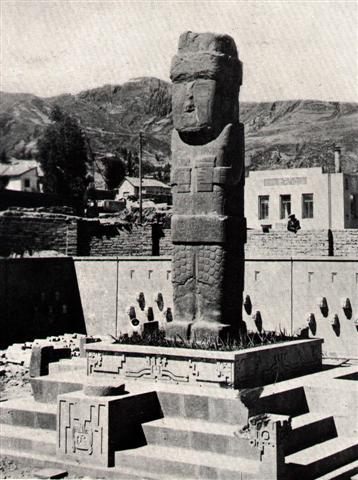
... The Hawaiian woman who was
interviewed chuckled because the
assassination of Captain Cook coincided
with the day we have named All
Hearts' Day - when in February 14
(2-14) the war-god Kuu returned
to power.

The assassination of Julius
Caesar came a month (29 days) later (and
365 - 29 = 336 = 14 * 24 = 12 * 28)
...
... Once upon a time there was an old
woman who owned a great potato field (mara)
where she planted her potatoes in spring
and harvested them in autumn. She was
famous all around for her many varieties
of wonderful potatoes, and she had
enough of them to sell at the market
place.
She planted her potatoes 7 in a row,
placing her foot in front of her as a
measure from one potato to the next.
Then she marked the place with a bean -
which would also give nourishment to the
surrounding potatoes. Next she changed
variety and planted 7 more followed by
another bean, and this was the pattern
she followed until all her 214 varieties
had been put down in their proper
places. She had drawn a map which she
followed and from where each sort of
potato could be located at the proper
time for its harvest ...
|
Counting the tresses of
Pachamama (the World
Mother) from right to left: |
|
1 |
26 |
78 |
1 |
29 |
90 |
|
2 |
26 |
2 |
30 |
|
3 |
26 |
3 |
31 |
|
4 |
25 |
104 |
4 |
34 |
124 |
|
5 |
26 |
5 |
31 |
|
6 |
27 |
6 |
30 |
|
7 |
26 |
7 |
29 |
|
Total = 396 = 182 +
214 |
And 182
(= 396 - 214) days further ahead will be
at glyph number 396 (with Sirius
following 6 days
later):
|
13 Febr |
2-14 (45) |
15 |
 |
 |
 |
|
Gb6-8 |
Gb6-9 (162) |
Gb6-10 (392) |
 |
 |
 |
|
Ga1-25 |
Ga1-26 |
Ga1-27 |
|
APRIL 15 (*25) |
16 (471) |
17 (107) |
|
June 18 |
19 (*90) |
20 (171) |
|
Dec 18 |
19 (*273) |
20 (354) |
|
16 Febr |
17 |
18
(414) |
19 (50) |
20 |
21 |
 |
 |
 |
 |
 |
 |
|
Gb6-11 (28 + 365) |
Gb6-12 |
Gb6-13 |
Gb6-14 (396) |
Gb6-15 (168) |
Gb6-16 |
 |
 |
 |
 |
 |
 |
|
Ga1-28 |
Ga1-29 |
Ga1-30 |
Ga2-1 |
Ga2-2 (32) |
Ga2-3 |
|
22 Febr (2-22) |
23 (54) |
24 (420 = 7 * 60) |
25 |
 |
 |
 |
 |
|
Gb6-17 (399) |
Gb6-18 |
Gb6-19 |
Gb6-20 |
|
APRIL 24 (*399) |
25 (115) |
26 |
27 |
|
June 27 (178) |
28 (364 + 153 - 365 + 27) |
29 (420 - 240) |
30 (364 + 182 - 365) |
|
Dec 27 |
28 |
29 |
nakshatra Sirius |
... The fate of Captain Cook
can perhaps be used to illustrate what
happened in early 'February' in the year
3112 BC and above I have used dates in tune
with the statement that Hun-Nal-Ye
(or at least his head)
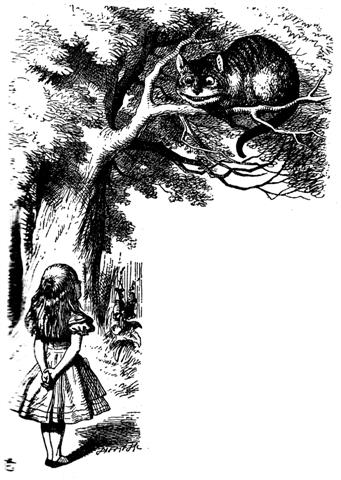
entered the Tree 542
days after the first 3-stone place in 21 May:
|
Itzam-Yeh defeated |
28 May
(148),
3149 BC |
|
First 3-stone place |
21 May
(141),
3114 BC |
|
Creation of our
present world |
13 Aug
(225),
3114 BC |
|
Hun-Nal-Ye became the
sky |
5 Febr
(36),
3112 BC |
|
(3149 - 3112) / 71 = 0.52 < (26.6 -
26) |
|
21 May, 3114 BC - 13 August, 3114 BC
= 225 - 141 = 84 (= 12 * 7)
21 May, 3114 BC - 5 February, 3112
BC = 542, which 'happens to be' the
sum of 365 days and 6 * 29½ nights. |
|
148 (May 28) - *70 =
78 (19 March) |
... This mythical bird is Itzam-Yeh,
Classic prototype of Wuqub-Kaqix,
'Seven-Macaw', of Popol Vuh fame. In that
story, in the time before the sky was lifted
up to make room for the light, the
vainglorious Seven-Macaw imagined
himself to be the sun. Offended by his
pride, the Hero Twins humbled him by
breaking his beautiful shining tooth with a
pellet from their blowgun.
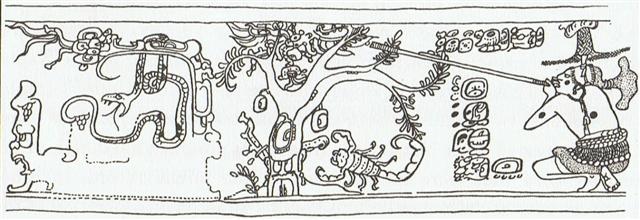
This pot shows One-Ahaw aiming at the bird
as he swoops down to land in his tree. As
Itzam-Yeh lands
on his perch, the text tells us he is
'entering or becoming the sky'. This
particular 'sky-entering' is not the one
mentioned in the Palenque text. It is the
final event that occurred in the previous
creation before the universe was remade.
Before the sky could be raised and the real
sun revealed in all its splendor, the Hero
Twins had to put the false sun, Itzam-Yeh,
in his place. If the date on this pot
corresponds to that pre-Columbian event, as
we believe it does, then Itzam-Yeh
was defeated on 12.18.4.5.0 1 Ahaw 3
K'ank'in (May 28, 3149 BC). After the
new universe was finally brought into
existence, First Father also entered the sky
by landing in the tree, just as Itzam-Yeh
did ...
We should here document also the 2nd
apperance in the G text of APRIL 1
(corresponding to 1 Janury) and the
following days:
|
29 Jan |
30 (365 + 30) |
31 (396) |
1 Febr |
 |
 |
 |
 |
|
Gb5-22 |
Gb5-23 |
Gb5-24 (148) |
Gb5-25 (378) |
 |
 |
 |
 |
|
Ga1-10 |
Ga1-11 |
Ga1-12 |
Ga1-13 |
|
MARCH 31 (*10) |
APRIL 1 |
2 (457- 80 = *377) |
3 (93) |
|
June 3 |
4 (*75) |
5h (76.1) |
6 (157) |
|
°May 30 |
31 |
°June 1 (*72) |
2 (153) |
|
'May 7 |
8 (128) |
9 (*414) |
10 (*50) |
|
"April 23 |
24 (*399) |
25 (115) |
26 (*36) |
|
25 March (84) |
(*5 = *75 - *70) |
27 |
28 |
|
Dec 3 |
17h (258.7) |
5 (*259) |
(157 + 183 = 340) |
|
...
Among the other ritual
coincidences, perhaps the
most remarkable was the
death of poor old Willie
Watman, seaman A. B., on the
morning of 1 February.
Watman was the first person
among Cook's people to die
at Kealakekua: on the
ceremonial day, so far as
can be calculated, that the
King's living god Kahoali'i
would swallow the eye of the
first human sacrifice of the
New Year. And it was the
Hawaiian chief - or by one
account, the King himself -
who specifically requested
that old Watman be buried at
Hikiau temple.
Messrs. Cook and King read
the burial service, thus
introducing Christianity to
the Sandwich Islands, with
the assistance however of
the high priest Ka'oo'oo and
the Lono 'brethren', who
when the English had
finished proceeded to make
sacrifices and perform
ceremonies at the grave for
three days and nights. So in
the early hours of 4
February, Cook sailed out of
Kealakekua Bay, still alive
and well. The King, too, had
survived Lono's visit and
incorporated
its tangible benefits, such
as iron adzes and daggers.
In principle, the King would
now make sacrifices to Kuu
and reopen the agricultural
shrines of Lono. The normal
cosmic course would be
resumed ... |
|
2 Febr |
3 |
4 (400
= 365 + 35) |
5 (36) |
 |
 |
 |
 |
|
Gb5-26 (150) |
Gb5-27 |
Gb5-28 |
Gb5-29 (382) |
 |
 |
 |
 |
|
Ga1-14 |
Ga1-15 |
Ga1-16 |
Ga1-17 |
|
ĸ Leporis (78.0),
RIGEL (Foot) = β Orionis
(78.1),
Flaming Star = IC405
(78.2),
CAPELLA = α Aurigae
(78.4), ο Columbae, τ Orionis
(78.8)
THUBAN (α Draconis)
|
λ Aurigae (79.0), λ Leporis
(79.6), ρ Aurigae (79.7)
ARCTURUS (α Bootis) |
Shur-narkabti-sha-iltanu-5 (Star
in the Bull towards the north)
σ
Aurigae (80.4),
BELLATRIX (Female Warrior) = γ
Orionis, SAIF AL JABBAR (Sword
of the Giant) = η Orionis
(80.7),
ELNATH (The Butting One) = β
Tauri
(80.9) |
ψ Orionis (81.1),
NIHAL (Thirst-slaking Camels) =
β Leporis
(81.7) |
|
APRIL 4 (*14) |
5 (460) |
6 |
7 |
|
June 7 (*78) |
8 (*444) |
9 (525) |
10 (161) |
|
... The Sacred Book of the
ancient Maya Quiche, the famous
Popol Vuh (the Book of
Counsel) tells of Zipacna, son
of Vucub-Caquix (= Seven Arata).
He sees 400 youths dragging a
huge log that they want as a
ridgepole for their house.
Zipacna alone carries the tree
without effort to the spot where
a hole has been dug for the post
to support the ridgepole. The
youths, jealous and afraid, try
to kill Zipacna by crushing him
in the hole, but he escapes and
brings down the house on their
heads. They are removed to the
sky, in a 'group', and the
Pleiades are called after them
... |
|
6
Febr (402) |
7 |
8 |
9
(40) |
 |
 |
 |
 |
|
Gb6-1 (383) |
Gb6-2 |
Gb6-3 |
Gb6-4
(157) |
 |
 |
 |
 |
|
Ga1-18 |
Ga1-19 |
Ga1-20 |
Ga1-21 |
|
KHUFU
MINTAKA (Belt) = δ Orionis,
υ Orionis (82.4), χ Aurigae (82.5),
ε Columbae (82.6) |
KHAFRE
Al Hak'ah-3 (Whit Spot) /
Mrigashīrsha-5 (Stag's Head) /
Turtle-20 (Monkey) /
Mas-tab-ba-tur-tur (Little Twins)
ARNEB = α Leporis, Crab Nebula = M1
Tauri
(83.0),
φ¹ Orionis (83.1),
HEKA = λ Orionis,
Orion Nebula = M42
(83.2), φ² Orionis (83.6),
ALNILAM
(String of Pearls) = ε Orionis
(83.7) |
MENKAURE
Three Stars-21
(Gibbon) /
Shur-narkabti-sha-shūtū-6
(Star in the Bull towards the south)
/
ANA-IVA-9
(Pillar of exit)
HEAVENLY GATE = ζ Tauri,
ν Columbae (84.0), ω Orionis
(84.2),
ALNITAK
(Girdle)
= ζ Orionis,
PHAKT (Phaet) = α Columbae
(84.7) |
ο Aurigae (85.8), γ Leporis (85.9)
YANG
MUN (α Lupi
|
|
APRIL 8 (383) |
9 (99) |
10 (465) |
11 (*21) |
|
June 11
(162) |
12 (*448) |
13 (*84) |
14 (530) |
|
°June 7 |
8 (*444) |
9 (*80) |
10 (161) |
|
'May 15 (500) |
16 (136) |
17 (*422) |
18 (*58) |
|
"May 1 (486) |
2 (*407) |
3 (123) |
4 (*44) |
|
10 Febr |
11 (42) |
12 (408) |
 |
 |
 |
|
Gb6-5 |
Gb6-6 (388) |
Gb6-7 (160) |
 |
 |
 |
|
Ga1-22 |
Ga1-23 |
Ga1-24 |
|
μ Columbae,
SAIPH = κ Orionis
(86.5), τ Aurigae, ζ Leporis (86.6) |
υ Aurigae (87.1), ν Aurigae (87.2),
WEZN (Weight) = β Columbae,
δ Leporis (87.7),
TZE (Son) = λ Columbae
(87.9) |
Ardra-6 (The Moist One) /
ANA-VARU-8 (Pillar to sit by)
χ¹ Orionis, ξ Aurigae (88.1),
BETELGEUZE (House of the Giant) = α
Orionis
(88.3), ξ Columbae (88.5), σ
Columbae (88.7)
ZUBEN ELGENUBI (α Librae) |
|
APRIL 12 (*22) |
4-13 (468) |
14 (104) |
|
June 15 |
16 (*87) |
17 (168 = 408 - 240) |
|
°June
11 |
12 (*83) |
13 (164) |
|
'May 19 (*59) |
20 (140) |
21 |
|
"May 5 (*45) |
6 (126) |
7 (492) |
|
6 April (96) |
7 |
8 (*18 = *88 - *70) |
|
... Hence the ultimate
ritual coincidence, which
was meteorological: one of
the fertilizing storms of
winter, associated with the
advent of Lono, wreaked
havoc with the foremast of
the Resolution, and the
British were forced to
return to Kealakekua for
repairs on 11 February 1779
... Mr. King remarks
that there were not as many
hundreds of people at their
return to Kealakekua as
there had been thousands
when they first came in. A
tabu was in effect, which
was ascribed to the king's
absence. By the best
evidence, the British had
interrupted the annual
bonito-fishing rite, the
transition from the Makahiki
season to normal temple
ceremonies. Cook was now
hors cadre. And things
fell apart ... |

|






.jpg)























